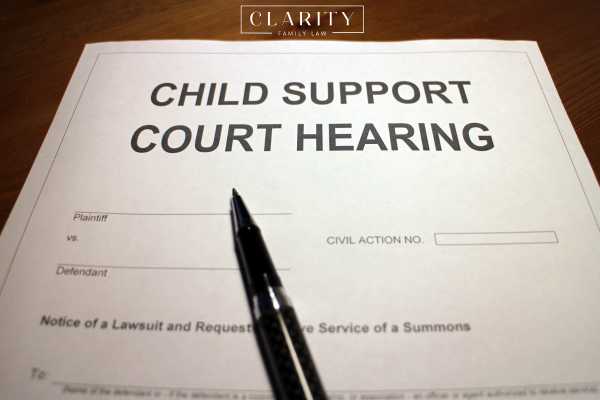Child support is a payment from one parent to another for their minor child's financial support. The amount and duration of payments vary by jurisdiction. Payments typically end when the child turns 18 or graduates from high school. They may also end if the child becomes emancipated or meets specific criteria.
A court order is usually needed to stop child support payments. If there are multiple children, the amount may be adjusted as each child reaches emancipation age. Payments may continue until all children are emancipated if ordered by the court.
If a parent fails to meet their obligations, the court may order continued support until the full amount is paid. In some states, the paying parent can request a modification or termination of their obligation if circumstances change significantly. Examples of such changes include income changes, job loss, remarriage, and disability.
Contact Clarity Law Firm at (313) 513-1919 to schedule a free consultation. Our Dearborn child support attorneys will answer all your questions and advise you on the next steps to take.
Michigan Child Support Laws
Child support in Michigan typically ends when the child turns 18 and is no longer a minor. However, there are exceptions. Support may continue if the current child is still in high school and will graduate before turning 19.
It may also continue if the child has a physical or mental disability that prevents them from supporting themselves. If the court deems the child emancipated, the parent's obligation to pay support ends or may be changed.
Additionally, Michigan law requires the court to review child support orders every three years to consider any changes in circumstances that may warrant modification or termination of the initial child support obligation.
Federal and State Regulations on Termination of Support Obligations
Child support obligations end when the child reaches the legal age determined by the state. Laws regarding termination may vary, so it's important to check local child support agency regulations.

Federal law also allows termination in certain situations, such as the custodial parent remarrying or no longer living with the child, or if the non-custodial parent passes away. In these cases, the court may end child support payments.
Family Court System and Its Role in Finalizing Child Support Agreements
The family court system plays a major role in finalizing child support agreements. The court system is responsible for making sure that both parties involved in the child support agreement understand and abide by the terms of the Michigan Office of Child Support agreement. This includes ensuring that any payments required are made on time and that all other obligations are met.
In most cases, parents will be able to agree between themselves as to the terms of the child support arrangement. However, if they are unable to do so, then the court may issue an order that stipulates what each party is responsible for regarding the support of their child or children.
The court will also be able to enforce existing child support orders and make sure that both parties are abiding by them. If not past-due support payments or non-payment may result in loss of recreational licenses, jail time, and public assistance.
Factors That Determine the Duration of Child Support Payments
Child support payments are a critical form of financial assistance for children whose parents are divorced or separated. The amount of child support payments is determined by child support guidelines outlined in the law and is based on both parents’ incomes, the number of children involved, and other factors such as the cost of raising a child, and health care coverage. While the amount of child support is determined by law, when those payments end varies greatly based on individual circumstances such as their monthly disposable income.
In general, the duration of child support payments depends on a variety of factors such as until the child in question reaches the age of 18 or 21 depending on the state, if they are still in school or not, and other individual circumstances. It is important to remember that each situation is unique and should be discussed with a child support lawyer before making any decisions regarding when child support payments should end.
- Age of Majority
- Child Custody Arrangements and Parenting Time Schedules
- Other Considerations, Such as Education, Childcare expenses, Medical Expenses, and Job Losses
- Post-Majority Child Support Obligations
- Reasonable Expectation for Full-Time Basis Payment Termination
- Legal Obligation to Provide Financial Assistance Until the Age of Majority is Reached
Requirements for Continued Child Support Payments After Age 18
Base child support is a legal obligation to financially support a minor or dependent child. In most states, the responsibility for child support payments typically ends when the child reaches 18 years of age or graduates from high school, whichever comes later. However, some courts may order parents to pay continued support after these traditional cut-off points.

In certain circumstances, parents may be required to continue providing financial support for their children beyond the age of 18. Some examples include providing financial support for college tuition, medical care expenses, or other necessary expenses that the child may incur. In addition, some states allow for post-majority child support payments in cases of disability, where the parent is obligated to provide financial assistance until the disabled child can become self-supporting.
In any case, it is important to understand the child support services and laws in your state and consult with a lawyer or other legal expert to understand what your actual costs in child support amount obligations may be upon reaching the age of majority for your child.
Court Orders for a Post-Majority Extension of Payments
When a child reaches the age of majority, typically 18 or sometimes 21 depending on the state, the court order for child support payments usually ends. However, depending on the circumstances, a court may issue an extension of child support payments past this major life event. This is known as a postmajority extension and generally happens in cases where the child has yet to complete their education, such as college or a vocational school.
A court may also order a post-majority extension in cases where the child has a long-term disability, is unemployed, or unable to support themselves. In these cases, it is important to discuss your situation with a divorce lawyer and understand what your child support determination rights and obligations are under the child support programs law.
Our Dearborn Child Support Attorneys at Clarity Law Firm are Here For You
At Clarity Law Firm, our experienced Dearborn family law attorneys understand the complexities of Michigan’s child support laws. We are here to provide comprehensive legal assistance and guidance throughout the entire process.
Child support is a legally required payment from one parent to another to financially assist with the care, maintenance, and education of their children. Child support calculations depend on a variety of factors such as the monthly income of both parents(business and self-employment income, social security benefits, and bonus income), the number of children involved, costs of childcare, and other components.
The duration of child support enforcement actions can also vary depending on the specifics of each child support process. To learn more about the child support termination process, contact Clarity Family Law child support attorneys today.